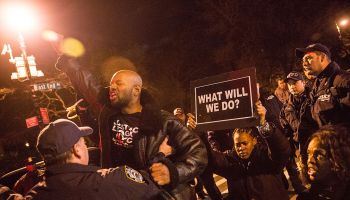RIYADH, Saudi Arabia (AP) — Yemen’s authoritarian President Ali Abdullah Saleh agreed Wednesday to step down amid a fierce uprising to oust him after 33 years in power. The U.S. and its powerful Gulf allies pressed for the deal, concerned that a security collapse in the impoverished Arab nation was allowing an active al-Qaida franchise to gain a firmer foothold.
See also: Yemen’s Saleh was slippery master of maneuvering
Saleh is the fourth Arab leader toppled in the wave of Arab Spring uprisings this year, after longtime dictators fell in Tunisia, Egypt and Libya. The deal gives Saleh immunity from prosecution – contradicting a key demand of Yemen’s opposition protesters.
Seated beside Saudi King Abdullah in the Saudi capital Riyadh, Saleh signed the U.S.-backed deal hammered out by his country’s powerful Gulf Arab neighbors to transfer power within 30 days to his vice president, Abed Rabbo Mansour Hadi. That will be followed by early presidential elections within 90 days.
“This disagreement for the last 10 months has had a big impact on Yemen in the realms of culture, development, politics, which led to a threat to national unity and destroyed what has been built in past years,” he said.
Protesters camped out in a public square near Sanaa’s university immediately rejected the deal, chanting, “No immunity for the killer.” They vowed to continued their protests.
President Barack Obama welcomed Saleh’s decision, saying it is an important step forward for the Yemeni people. He urged all involved to move immediately to implement the agreement. Obama said the U.S. would stand by the Yemeni people “as they embark on this historic transition” to realize their aspirations for a new beginning, and he acknowledged “important work” done by Gulf allies.
Saleh has clung to power despite the daily mass protests calling for his ouster and a June assassination attempt that left him badly wounded and forced him to travel to Saudi Arabia for more than three months of hospital treatment. He was burned over much of his body and had shards of wood embedded in his chest by the explosion that ripped through his palace mosque as he prayed.
Shortly before Saleh inked the agreement, U.N. Secretary-General Ban Ki-moon said the president told him he will travel to New York for medical treatment after signing it. He didn’t say when Saleh planned to arrive in New York, nor what treatment he would be seeking.
Since February, tens of thousands of Yemenis have protested in cities and towns across the nation, calling for democracy and the fall of Saleh’s regime. The uprising has led to a security collapse, with armed tribesmen battling security forces in different regions and al-Qaida-linked militants stepping up operations in the country’s restive south.
For months, the U.S. and other world powers pressured Saleh to agree to the power transfer proposal by the Gulf Cooperation Council, and he agreed then backed down several times before. All the while, the uprising raged, security and the economy deteriorated. Al-Qaida in the Arabian Peninsula grew more bold, even seizing some territory.
Even before the uprising began, Yemen was the poorest country in the Middle East, fractured and unstable with a government that had weak authority at best outside the capital Sanaa.
















